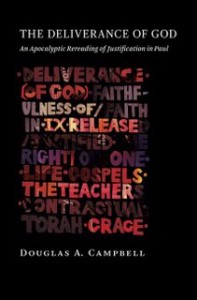
The main cannons of the book are aimed at the traditional “justification by faith” reading that Douglas called into question in his Quest for Paul’s Gospel a few years ago. Only this time, at 1200+ pages, he definitely takes the time to develop his arguments fully. He takes aim at what he sees as an individualistic, contract-focused distortion of Paul’s ecclesial and pneumatic/apocalyptic teaching. If nothing else, the sheer volume of material covered and the amount of scholarship with which Campbell interacts makes the book worth having as a reference.
My upcoming SBL paper, “Gentiles Who Keep the Law: Paul’s Law-Keeping Gospel” interacts heavily with DOG on some key readings in Romans 2. Though I am quite partial to Douglas’ critique of “JF” theology and large portions of his own readings, one place we differ is in his reading of Romans 2, much of which he assigns to the opposing “teacher(s)” (borrowing Lou Martyn’s terminology) with whom Paul is competing in Romans.
Despite my disagreement with Douglas on this and a few other key points, I tend to agree with much of his critique against the standard/traditional interpretations of Pauline material (including much of the NPP as well). (As someone who doesn’t “fit” in any particular camp, I especially appreciate Campbell’s willingness to think outside the box and not always take an either/or approach when there are viable options that have been largely ignored or simply not seen.) I also applaud him for not abandoning (as many have) the idea that there might actually be a unified “center” or “core” to Paul’s thought buried within the many contingencies of the epistolary format.
Though I doubt anyone would ever agree with everything in it (there’s 1200 pages of material!), Campbell has made a gigantic contribution to the field (in more ways than one). It’s definitely a book worth buying for anyone with an interest in Paul.